Local College Football Hall of Fame Inductees
Billy 'Sppok' Murphy
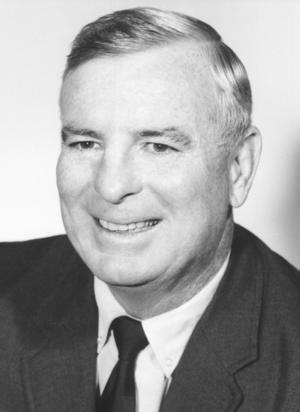
Position: Coach
School: Memphis
Years: 1958-1971
Inducted: 2022
Place of Birth: Lorenzo, TX
Date of Birth: Jan. 13, 1921
Place of Death: Memphis, TN
Date of Death: Feb. 21, 2008
Record: 91-44-1 (67.3%)
The winningest coach in Memphis history, Billy Jack Murphy headed the Tigers' program for 14 years, posting winning records in all but two seasons and leading the school into the national rankings. Murphy, who passed away in 2008 at the age of 87, becomes the second person with ties to Memphis to enter the College Football Hall of Fame.
In 1958, Murphy became head coach at Memphis, then-known as Memphis State, and he would take the program from obscurity to national prominence with multiple firsts while winning 67.3 percent of his games before his exit after the 1971 season with an overall record of 91-44-1. In 1960, he led the team's transition to major college status as a member of the NCAA University Division while posting an 8-2 record. As the Tigers' program grew in stature, Murphy replaced small-college opponents with major programs, including wins against Florida State, Houston, Miami (FL), Mississippi, Mississippi State, South Carolina, Virginia Tech and Wake Forest. In 1962, Murphy led the Tigers to their first win over a member of the SEC, a 28-7 victory at Mississippi State.
In 1963, the Tigers posted the school's first undefeated season since 1938 with a 9-0-1 record, and Murphy claimed National Coach of the Year honors from The Detroit Times while Memphis running back Dave Casinelli claimed the NCAA rushing title and the defense posted five shutouts. The team finished No. 14 in the UPI Coaches Poll, the highest ranking in school history. The lone tie that season, a 0-0 tilt, came against No. 2 Ole Miss who had not been shutout in 47 games. In 1967, Murphy and the Tigers would finally gain the upper hand, claiming the program's first win against Ole Miss with a 27-17 victory at home.
In 1968, Memphis ended its 27-year run as an independent, joining the Missouri Valley Conference, and Murphy would earn Missouri Valley Conference Coach of the Year honors in three of the school's first four seasons in the conference. On Dec. 18, 1971, Murphy led Memphis to its first appearance and first win in a major bowl with a 28-9 victory over San Jose State in the Pasadena Bowl. The game marked Murphy's final appearance as a head coach, and he transitioned fulltime to athletics director, a role he had started in 1966 and held until 1981.
Murphy grew up in Siloam Springs, Arkansas, before enrolling at Mississippi State in 1939 and playing as an All-SEC tailback for future College Football Hall of Coach Allyn McKeen who had previously headed the Memphis program. In 1943 and the midst of World War II, Murphy joined the Marine Corps Reserve and transferred to Duke University for training with the V-12 Program. He served heroically in the South Pacific, narrowly escaping with his life on at least four occasions and receiving the Bronze Star, the Presidential Citation and the Navy Citation. Following World War II, Murphy returned to Mississippi State as the captain of the 1946 Bulldogs team.
After graduating from Mississippi State, Murphy took his first job as an assistant coach at Memphis for a five-year stint. In 1951, he returned to Mississippi State under head coach Murray Warmath who he then followed to Minnesota in 1954 for four seasons as the running backs coach before becoming the Memphis head coach at the age of 37 in 1958. Murphy has been inducted into the State of Tennessee Sports Hall of Fame, the Mississippi State Hall of Fame and the Memphis M Club Hall of Fame. Each year the Billy J. Murphy Award is presented to a former Memphis athlete who has excelled in their chosen profession after graduation, and the Tigers' practice facility is named in Murphy's honor.
Al Wilson
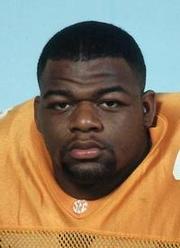
Position: Linebacker
School: Tennessee
Years: 1995-1998
Inducted: 2001
Place of Birth: Jackson, TN
Date of Birth: June 21, 1977
Jersey Number: 27
Height: 6-0
Weight: 240
High School: Jackson Central-Merry HS (Jackson, TN)
Acting as the quarterback of Tennessee's defense, Al Wilson capped his career as one of the Vols' greatest linebackers by leading them to the 1998 national championship. The Jackson, Tennessee, native becomes the 21st player in school history to join the College Football Hall of Fame.
A consensus First Team All-America in 1998, Wilson was the only All-America selection from the perfect 13-0 Vols squad that won the inaugural BCS National Championship at the Fiesta Bowl against Florida State. He also guided Tennessee to three other bowl games, including consecutive wins at the Citrus Bowl in 1996 and 1997. During his career in Knoxville, Wilson led the Vols to back-to-back SEC titles and four top 10 finishes (No. 3 in 1995, No. 9 in 1996, No. 7 in 1997 and No. 1 in 1998).
A finalist for the 1998 Nagurski Trophy, Wilson earned First Team All-SEC honors as a senior and second team all-conference laurels as a junior while losing only three conference games in four years. The 1998 team captain posted 12 tackles and a school-record three forced fumbles in the Vols' win over No. 6 Florida that season, which ended Tennessee's five-game losing streak to the Gators. A 1999 Senior Bowl participant, Wilson played for College Football Hall of Fame Coach Phillip Fulmer and alongside Hall of Famer and 1997 Campbell Trophy® recipient Peyton Manning. Finishing his stellar career with 272 total tackles, he is enshrined in both the University of Tennessee Athletics and the State of Tennessee Sports halls of fame.
A first-round pick by the Denver Broncos in the 1999 NFL Draft, Wilson was a five-time Pro Bowl selection while playing for the team from 1999-2006.
Wilson co-founded Project FANchise, which previously established the first-ever fan-controlled professional sports franchise, the Salt Lake Screaming Eagles, and operated the Colorado Crush to play in the Indoor Football League. Off the field, he has annually hosted children's football camps and resides in Atlanta.
Ed "Big Mo" Molinski
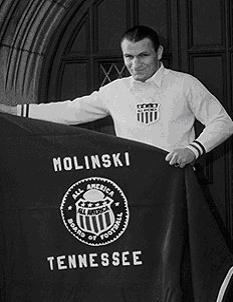
Position:Guard
School: Tennessee
High School: Massillon, OH (Washington HS)
Years: 1938-1940
Inducted: 1990
Place of Birth: Scranton, PA
Date of Birth: 8/20/1917
Place of Death: Memphis, TN
Date of Death: 6/26/1986
Jersey Number: 36
Height: 5-10
Weight: 186
Member Biography:
Ed Molinski was a Hall of Fame college football football player for the University of Tennessee. He later became a medical doctor after being involved in boxing, World War II, and college coaching.
Molinski played his high school ball at Washington High School in Massillon, Ohio, where he played for legendary coach Paul Brown from 1933 to 1935. After graduating, he moved on toTennessee where he played for another legendary coach, Robert Neyland. Molinski was a standout player the guard position in both high school and college.
While at Tennessee, he helped lead the teams there to a 31-2 record and three undefeated regular seasons. He was a member of the 1938 Tennessee team that won the National Championship, and the 1939 team that put together an unscored upon regular season. That year, Molinski was named to several All American teams. He was also named All American the following season in 1940. Molinski was an All American at the guard position, but was noted as a great player on both sides of the ball. He played on the defensive line for his entire career at Tennessee. Molinski was known as a fiery player during his time at Tennessee, a benefit for the offensive and defensive line positions. His temperament was apparent when he was ejected early in the 1939 Orange Bowl, the final game for the 1938 championship team. Molinski was elected to the College Football Hall of Fame in 1990. Molinski was also involved in Golden Gloves boxing. He was the state heavyweight champion in Tennessee, while also captaining the university boxing squad. After college, Molinski served in the United States Marine Corps during World War II, earning the rank of second lieutnant.
Following the war, Molinski worked as an assistant football coach at Memphis State and Mississippi State in addition to studying for a medical degree. The then Dr. Molinski finally settled in Memphis, Tennessee and practiced medicine until his death. Molinski earned the M.D. degree from the UT Center for the Health Sciences. He also served as team doctor for Memphis State and various high schools throughout the Memphis area.
Allyn McKeen
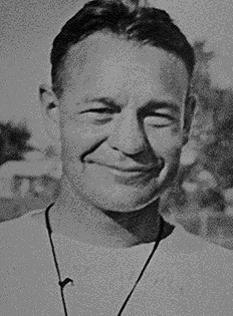
Position:Coach
School: Memphis State, Mississippi State
Years: 1937-1948
Inducted: 1991
Place of Birth: Fulton, KY
Date of Birth: 1/26/1905
Place of Death: Montgomery, AL
Date of Death: 11/13/1978
Member Biography:
Allyn McKeen played guard for Tennessee from 1925 to 1927, also lettered in tennis, track and boxing and was senior class president. He was head coach 1937-38 at West Tennessee State (now Memphis State), then at Mississippi State 1939-42 and 1944-48 (The school had no team in 1943). His 1940 team went 9-0-1 and beat Georgetown in the Orange Bowl. His 1941 team won the Southeastern Conference, the only Southeastern Conference football championship won by Mississippi State. His career record was 78-25-3. After he left coaching, he was a director of the Blue-Gray game in Montgomery, Alabama. Allyn McKeen was born in 1905 in Fulton, Kentucky, he died in 1978 in Montgomery. There is a poignant ending to the McKeen story. His widow, Susan, was seriously ill when notified Allyn had been elected to the Hall of Fame. "The news was given her January 25, 1991, and made her very happy," reports the family. "She died the next day."
Parker "Bullet" Hall
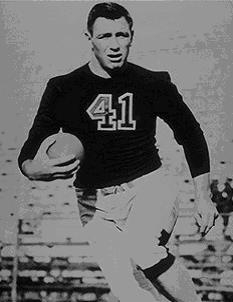
Position:Halfback
School: Mississippi
High School: Tunica, MS (Tunica HS)
Years: 1936-1938
Inducted: 1991
Place of Birth: Tunica, MS
Date of Birth: 12/10/1916
Place of Death: Vicksburg, MS
Date of Death: 2/8/2005
Jersey Number: 41
Height: 6-0
Weight: 198
Member Biography:
His name is in the record book as Parker Hall, he was known on the football field as "Bullet" Hall, and in formal text he is Linus Parker Hall. By any name, he had a dream season in 1938. He led the nation in scoring and all-purpose running and was named to the All-America teams of the Associated Press and United Press. He scored 73 points on 11 touchdowns and seven extra points. He gained 1,558 yards in 11 games on the all-purpose chart; this includes rushing, pass receiving, kick returns and interception returns. And he was also the national leader in rushing average, kick return average, most interceptions, and touchdowns responsible for (11 rushing, 11 passing). Mississippi had not won a Southeastern Conference game for two years, but this changed in 1938 with a new coach, Harry Mehre, and Hall's scintillating play. Ole Miss went 3-2 in the conference, 9-2 overall. Hall also played five years of pro ball and three years for St. Mary's Preflight. In 1939 with the Cleveland Rams, he was Most Valuable Player in the National Football League. He moved to Memphis in 1947 and was in the lumber business 37 years before retiring.